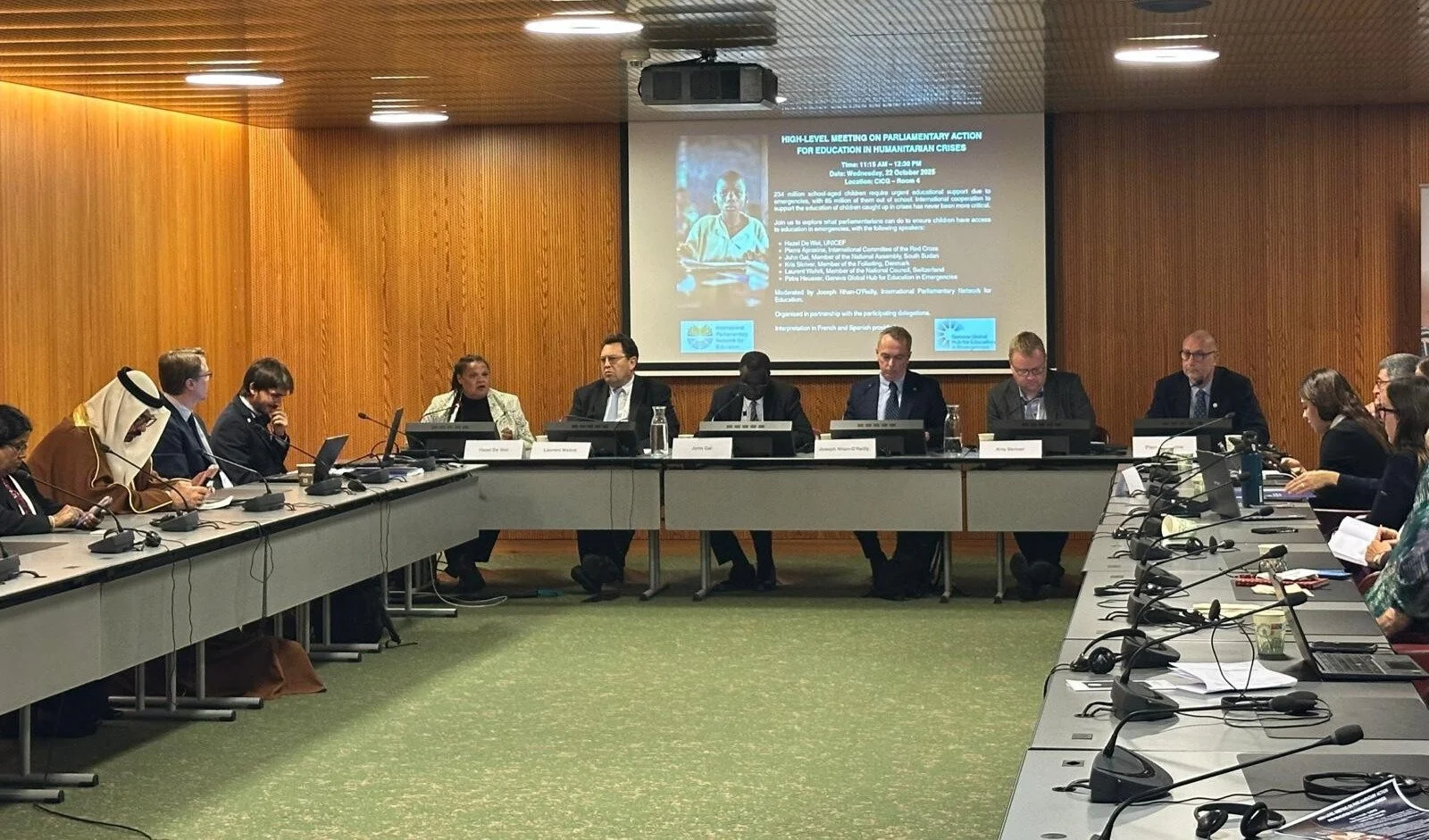Global parliamentarians commit to renewal of humanitarian action for education
Lawmakers from crisis-affected and donor countries gathered in Geneva during the IPU’s 151st Assembly to identify parliamentary action to protect and promote the right to education in emergencies.
Speakers from the parliaments of Palestine, South Sudan, and Myanmar highlighted the devastating impact of war on education systems, calling for stronger parliamentary action to safeguard schools, uphold international humanitarian law, and reverse cuts to humanitarian assistance.
Parliamentarians from Switzerland, Denmark, and the UK discussed the importance of external funding for education in crises and of the need to galvanize political committment to international humanitarian law.
Parliamentarians can play a crucial role in providing education for the most vulnerable in crisis situations — no matter where they come from. This message came through loud and clear as lawmakers gathered for an event on the sidelines of the Inter-Parliamentary Union’s 151st Assembly in Geneva on 22 October 2025, co-hosted by the Geneva Global Hub for Education in Emergencies (EiE Hub) and the International Parliamentary Network for Education (IPNEd).
The event brought together lawmakers from both crisis-affected and donor countries, as well as other stakeholders from civil society and international organisations. Speakers highlighted the unique platform parliamentarians have to ensure both political and financial support for education in crisis situations, including by passing legislation, allocating budgetary resources, and making the public case for multilateralism and solidarity across borders.
Musa Hadid, Deputy Chairman of the Palestinian National Council, spoke of the unprecedented devastation to the education sector in Gaza since 2023. More than 20,000 children have been killed, 97% of schools have been damaged and hundreds of thousands of students have just begun their third year out of formal education.
“The biggest threat we as Palestinians face for ‘the day after’ is a generation that is not educated. It is now not just about infrastructure and reconstruction – we are talking about a whole generation. Whoever destroys a school destroys an entire nation.”
Dr John Gai, an MP and former Minister of Education from South Sudan, discussed the extreme challenges of providing schooling amid an active conflict. These included mass displacement, disruption of school enrolment, and the active targeting of education facilities by warring parties. Dr. Gai stressed the critical role a legislature can play in such circumstances:
“Parliament was key to uniting our country, and to ensure that we continued to use a unified curriculum. A strong standing committee on education can work wonders.”
Laurent Wehrli, Member of the National Council, highlighted how COVID-19 had been an eye-opener in his native Switzerland, showing how fragile access to education can be even in countries usually not affected by crises.
“Before the pandemic, we never had to close schools or really think about how to provide education for children in crisis. It helped us see that it’s a problem not just in the Global South, but for everyone – and that we must continue to help, even after COVID-19.”
Mr. Wehrli also stressed the critical role teachers play in delivering education in emergencies, and the importance of finding ways to ensure that refugee teachers can be integrated into such responses.
Kris Skriver, MP from Denmark, addressed how – despite the global hardening of attitudes to foreign aid – his country remained committed to the UN’s goal of dedicating 0.7% of Gross National Income as Official Development Assistance.
“There is strong support for the ‘0.7% target’ across the political spectrum. We see it not just as a moral obligation to fight poverty and promote human rights, but as an investment in our own national security.”
In addition to lawmakers, panellists also included representatives from international organisations.
Hazel de Wet, Deputy Director of UNICEF’s Office of Emergency Programmes, stressed the challenges posed by recent, sweeping reductions to foreign aid, saying, “these cuts undermine all governments’ abilities to fulfil every child’s right to education. In emergencies, education is not a luxury – it is a lifeline.”
Pierre Apraxine, Head of the Protection of the Civilian Population Unit at the International Committee of the Red Cross, expressed concern about how international humanitarian law (IHL) is increasingly disregarded in armed conflicts worldwide, with often devastating consequences for the continuity of education, “too often, students and teachers are attacked directly, while schools are destroyed or used for military purposes in contravention with IHL. This lack of respect for IHL is the most important challenge we see in armed conflicts today.”
The panel presentations were followed by an engaging discussion.
Dr. Win Myat Aye, Ministry of Humanitarian Affairs and Disaster Management of the National Unity Government, Myanmar, stressed the devastating impact of conflict in his country on education, including due to repeated bombings of schools.
Baroness Christine Blower, a Member of the UK’s House of Lords, highlighted the importance of continued foreign aid towards education, including through the upcoming replenishments of the funds Education Cannot Wait and the Global Partnership for Education.
In the concluding remarks, Joseph Nhan-O’Reilly, Executive Director of IPNEd, and Petra Heusser, Executive Director of the Geneva Hub for Education in Emergencies, set out concrete actions MPs can take to ensure the protection of education, including through the principles listed in the Geneva Declaration on Education in Emergencies and Protracted Crises.



